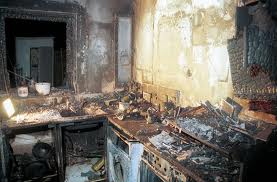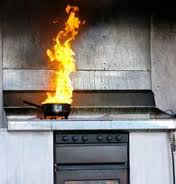The kitchen is potentially the most hazardous room in the home. There are hot surfaces, naked flames, plentiful supplies of fuel, electrical appliances, lots of materials which can burn and scald, etc. There are plenty of potential distractions also i.e. children, telephones, televisions/radios, neighbours, washing machines, and the list goes on and on!
It is important to have;
- a “safe work” practice, to avoid distractions
- a Fire Blanket and Fire Extinguisher
- a fully stocked First Aid kit

The aftermath of a kitchen fire
Tips to improve Fire Safety in the Kitchen
- Most burn and scald incidents to children happen in the kitchen. Never allow children in the kitchen unsupervised.
- Keep matches and lighters out of the reach of children. If you need lighters and matches in the kitchen, get childproof ones.
- Spark devices or heated elements are a safer way of igniting gas appliances.
Cookers
- Keep cookers clean – allowing grease to build up is a fire risk.
- Turn off the cooker when not in use.
- Check that the cooker is turned off before going to bed.
- Never use a cooker for drying clothes.
- Clean or replace filters on extractor fans regularly.
- Keep the handles of pots turned inwards and not over the flames or rings.
- Never allow electrical cables run across a cooker i.e. electric kettles, toasters etc.
- Take care with loose clothing when reaching over cookers, particularly with gas rings.
- Never hang tea towels on or over cookers.
- Gas cookers and boilers need fresh air to work correctly. Never block up vents etc. Good ventilation is also vital if there is a gas leak.
Chip Pans/Deep Fat Fryers
- Avoid/take extreme care when using “chip pans” as they are a major fire hazard.
- Never fill the chip pan/deep fat fryer more than one third full of oil or fat.
- Test the oil/fat temperature by placing a small piece of bread in it. If it crisps quickly the oil/fat is ready.
- If the oil/fat is smoking then it is too hot. Turn the heat off and let it cool down before starting again.
- Never move a hot chip pan/deep fat fryer.
- Never leave a chip pan/deep fat fryer unattended.
- Never cook chips when you have taken alcohol as people tend to fall asleep when waiting for the oil/fat to heat up. This is a major cause of fires.
- Use a thermostatically controlled deep fat fryer or switching to oven chips can prevent most of these fires.

Deep frying food
- If you regularly deep-fry food, consider buying an electric deep-fat fryer. They have thermostats fitted so they can’t overheat and are safer to use.
- Dry food before putting it into hot oil, to prevent the oil from splashing and burning you.
- If you don’t have an electric deep-fat fryer and are using an ordinary pan, never fill it more than one-third full.
- If the oil starts to smoke, it’s too hot. Turn the heat off and leave it to cool.
If a pan catches fire
- Don’t take any risks – get everyone out of your home and call the Fire Service.
- Don’t move the pan and never throw water over it. Turn off the heat under the pan (if it’s safe to do so) and allow it to cool completely.
- Cover it if it is safe to do so
